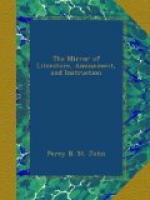The transfer of these sacred ashes on the 6th of June, 1801, was one of the most brilliant spectacles of the short-lived Italian republic, and to consecrate the memory of the ceremony, the once famous fallen Intrepidi were revived, and re-formed into the Ariostean academy. The large public place through which the procession paraded, was then for the first time called Ariosto Square.[5]
We must return to Mr. Stebbing’s delightful Lives of the Italian Poets, which work has so frequently aided us in the previous columns.
[1] For these Lord B. acknowledges
his obligation to his excellent
friend
J.C. Hobbouse, Esq. M.P.
[2] In “Lives of the
Italian Poets.” By the Rev. Henry Stebbing,
vol.
ii.
[3] Few persons will be disposed
to question this extreme
sensitiveness,
since instances of similar effects on men of
genius
are by no means rare. Whoever has read Mr. Moore’s
Life
of
Byron must have remarked the asperity with which
he
inveighs
against blundering printers in the Letters to Mr.
Murray,
his publisher.
[4] “Childe Harold,” canto 4, st. xli.
[5] Notes to lines 1 and 2 of the preceding stanza.
* * * * *
FANNY.
(For the Mirror.)
“I saw thy form in youthful prime,
Nor thought that pale decay
Would steal before the steps of time,
And waste thy bloom away.”—MOORE.
Her place of rest is mantled o’er
With dews of early morning;
She heeds not now the winter’s roar,
Nor flowery spring’s
adorning.
Alike to her, when summer’s heat
Glows on her verdant bed,
Or when the snows of winter beat,
And a fleecy covering shed.
And rarely do they mention her,
Who most her fate should mourn;
And little did they weep for her,
Who never can return.
But back to memory let me bring
Her laughing eyes of blue:
She was, on earth, as fair a thing
As fancy ever drew.
She lov’d and was belovd again!’
And quickly flew the winged
hours;
Love seem to wreath his fairy chain
Of blooming amaranthine flow’rs.
She deem’d not time could ever blight
That whisper’d tale
she lov’d to hear;
Alas! there came a gloomy night,
That threw its shadows on
her bier.
He told her time should never see
The hour he would forget her—
That future years should only be
Fresh links to bind him to
her;
That distant lands his steps might trace,
And lovely forms he’d
see,
But Fanny’s dear, remembered face,
His polar-star should be.
“O! ever shall I be the same,
Whatever may betide me,—
Remembrance whispers Fanny’s name,
And brings her form beside
me.




